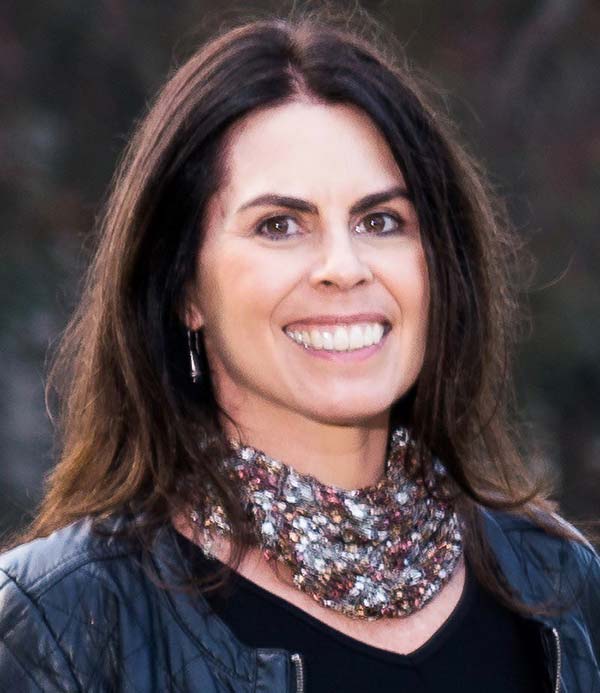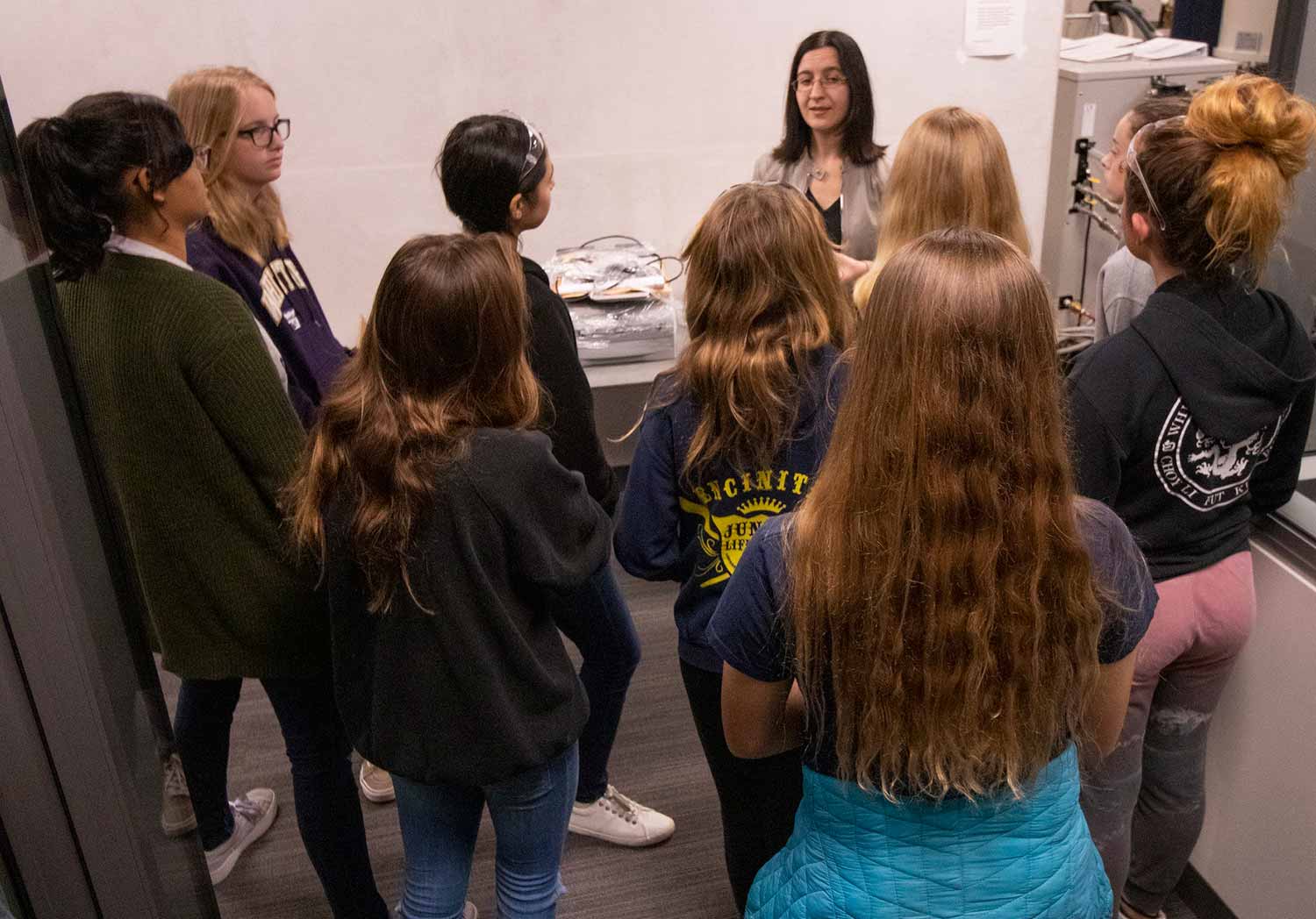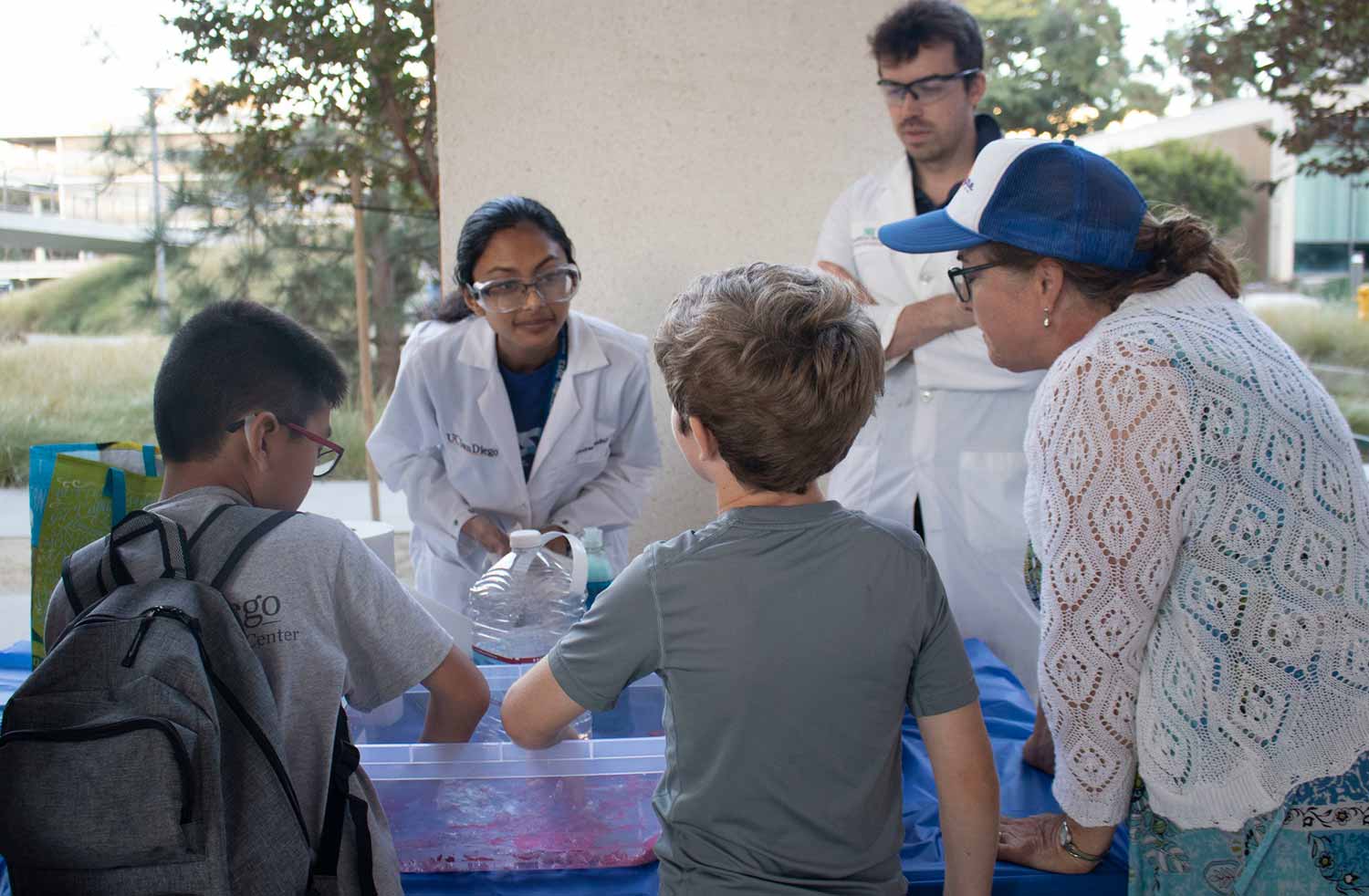
By:
- Cynthia Dillon
Published Date
By:
- Cynthia Dillon
Share This:
Walking the Walk of Change

VC-EDIC and Professor of Chemistry and Biochemistry Stacey Brydges. Photo credit: Binzhong Photography
Women in the Department of Chemistry and Biochemistry are taking bold steps toward increased balance and fairness on campus. For example, Department Chair and Distinguished Professor Vicki Grassian set the pace by establishing the role of Vice Chair of Equity, Diversity, Inclusion and Climate (VC-EDIC). Professor Stacey Brydges—a long-time leader in chemistry education and ardent champion of social justice and access to/retention in STEM—quickened the pace when she became the inaugural vice chair.
Grassian is a leader who works collaboratively to effect change. She previously served as executive associate dean for the Division of Physical Sciences and led the Task Force on the Status of Women in the Physical Sciences along with Associate Dean of EDI Alison Coil. Brydges, who was part of that task force—along with other scientists in the division—said that the processes and products used by the task force offer a great template from which to work.
“The VC-EDIC position recognizes the obligation and opportunity to enhance the culture of the department and the chemical sciences more broadly by placing diversity at the center of research, teaching and service,” said Brydges. “In doing so, it emphasizes that diversity is integral to academic excellence and our day-to-day activities, and that all of us are responsible for creating and maintaining a positive and inclusive environment.”
Quoting David Assai (2020) of the Howard Hughes Medical Institute (“Who owns the challenge will change”), Brydges said that the ultimate goal is to ensure that the department reflects the diversity of the nation’s talent pool, and that all community members—faculty, postdoctoral fellows, graduate and undergraduate students, and staff—feel like they belong and can succeed given the structures, policies and practices in place. To provide all stakeholders a voice and role in realizing this vision, Grassian also created a departmental EDIC Council, which Brydges will also lead.

Assistant Professor of Chemistry and Biochemistry Galia Debelouchina addresses a group of students from the San Diego Better Education for Women in Science and Engineering (BEWiSE) community about magnetism last year. Photo credit: Michelle Fredricks, UC San Diego Physical Sciences
“The new VC-EDIC position and the EDIC Council were initiated to continue to build momentum to effect change in the Department of Chemistry & Biochemistry. I am very excited that Professor Stacey Brydges will lead the department’s efforts as the inaugural VC-EDIC,” said Grassian. “I am also very pleased that we have so many individuals—faculty, students and staff—who want to be members of the EDIC Council, including Assistant Professor Dontarie Stallings, who has a wealth of experience as associate director for OXIDE (Open Chemistry Collaborative In Diversity Equity), a national resource that promotes inclusive excellence in the academic chemistry community."
Grassian explained that the department is building on the work and efforts of a number of people. One of them is Distinguished Professor Susan Taylor, the last chair of the former EDI departmental committee, who along with her committee made a number of important recommendations. Others include Coil and Dean Steven Boggs, whose commitment to excellence searches brings new faculty to campus who also are committed to excellence in research, teaching and EDI.
“What I like to say is that we are in this for the long haul, and it is great that we have Professor Brydges who has deep knowledge, vision and dedication leading us into the future in her new role as VC-EDIC,” said Grassian.
Brydges said that she is honored to serve as the VC-EDIC and excited to work with department leadership and other colleagues to establish chemistry and biochemistry as a model for inclusive excellence. She noted that the department is in the midst of tremendous growth, marked by the hiring of eight new faculty members last academic year.
“There is an unquestionable shared commitment to and support for inclusive change. The high level of engagement is manifested in numerous initiatives led by faculty, students and staff, as well as our large research centers such as CAICE (the Center for Aerosol Impacts on Chemistry of the Environment, co-directed by Grassian and directed by Distinguished Professor Kimberly Prather) and the new UC San Diego MRSEC (Materials Research Science and Engineering Center, directed by Professor Michael Sailor),” said Brydges. “These include various programs, training grants, student affinity groups, such as the Society for Women in Graduate Studies (SWIGS), and regular outreach and public engagement efforts.”

The Department of Chemistry and Biochemistry is big on community outreach. Last year, faculty and students celebrated National Chemistry Week by hosting the first "All Hands-On!" campus event. Here UC San Diego students offer educational activities to K-12 students. Photo credit: Tatiana Diaz-de-leon, UC San Diego Physical Sciences
Brydges noted that, along with a new website, the EDI strategic plan will help the Department of Chemistry and Biochemistry cement and communicate its values as it engages in authentic dialogue, builds community and addresses the equity gaps that still exist. She said that despite the size and structure of campus, the principles of diversity must be integrated into all core activities in such a way that every member of the community deems it their responsibility to cultivate inclusion and equity.
“More than ever, this is evident as we learn and connect with each other in expanding our awareness, understanding and engagement around anti-racism,” she said.
Brydges’ strides in these efforts are long. For example, she led the National Science Foundation’s Research Experiences for Undergraduates (REU) Program at UC San Diego, “Chemistry Connections for Community College Students (4Cs),” along with Professor Haim Weizman. She is co-PI of an ongoing NSF Early Concept Grants for Exploratory Research (EAGER) project, which promotes active-learning strategies in two-year, Hispanic-serving institutions (2Y-HSI) through collaborative professional development for STEM faculty and UC San Diego graduate students. A collaboration with Professor Stanley Lo and graduate students of the Math and Science Education Doctoral program bridges research on instructors’ conceptions of diversity in higher education and graduate student socialization. She has even designed the board game, “Catalyze! Lowering the Activation Barriers to Undergraduate Students’ Success in Chemistry,” which she has used to infuse EDI principles in Instructional Assistant/Teaching Assistant professional development. She also currently serves as director of education and outreach at MRSEC.
“The work of VC-EDIC is very much coupled to my own teaching, research, and service,” said Brydges. “As a first-generation college student from a rural background and a woman in science, I appreciate immensely the importance of inclusive teaching and mentoring. It is an awesome responsibility to ensure all our students feel they belong and can succeed in the classroom and beyond—and we can’t dismiss the explicit messages we send via our curriculum and programs.”
She said that last spring a student asked her if there was any way that chemistry can connect to the social injustices we face today. For example, she said we see the deleterious impacts of inequity as the coronavirus epidemic disproportionality affects people of color and other groups.
“We owe it to our students to provide contexts that are meaningful and relevant, and examples that draw from diverse life experiences. Ultimately, science is an integral part of our daily life and the efforts to achieve a better and more sustainable world. To ensure the perspectives and interests of all people are part of research and policy, we must advocate for equitable access and support for persons previously excluded from science,” said Brydges. “In my roles, I have the opportunity to tackle these issues from a complementary vantage.”
Share This:
You May Also Like
Stay in the Know
Keep up with all the latest from UC San Diego. Subscribe to the newsletter today.


